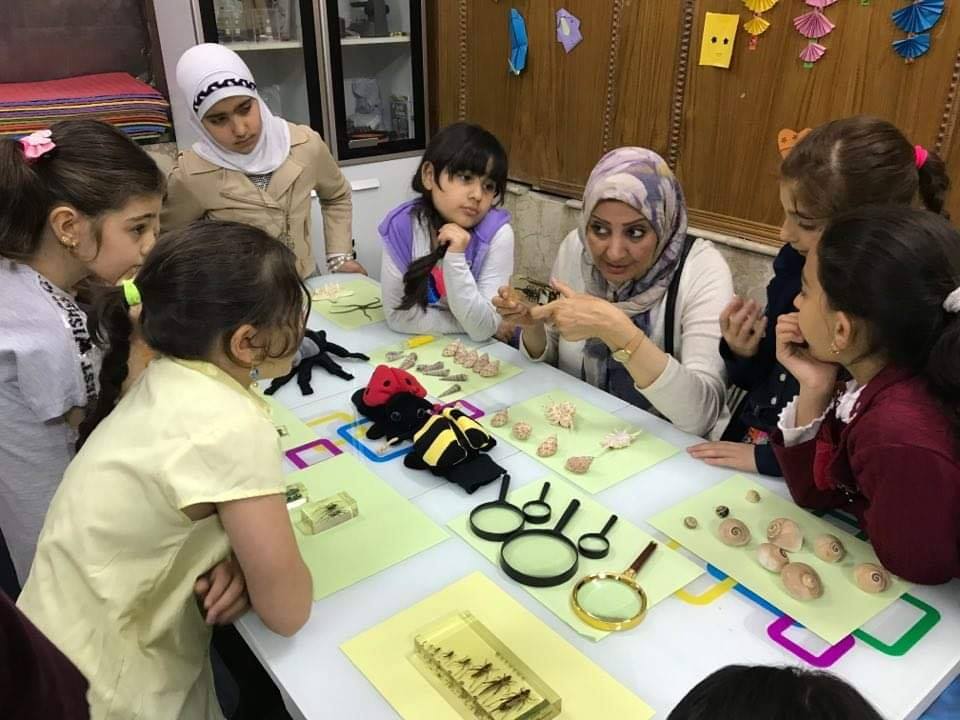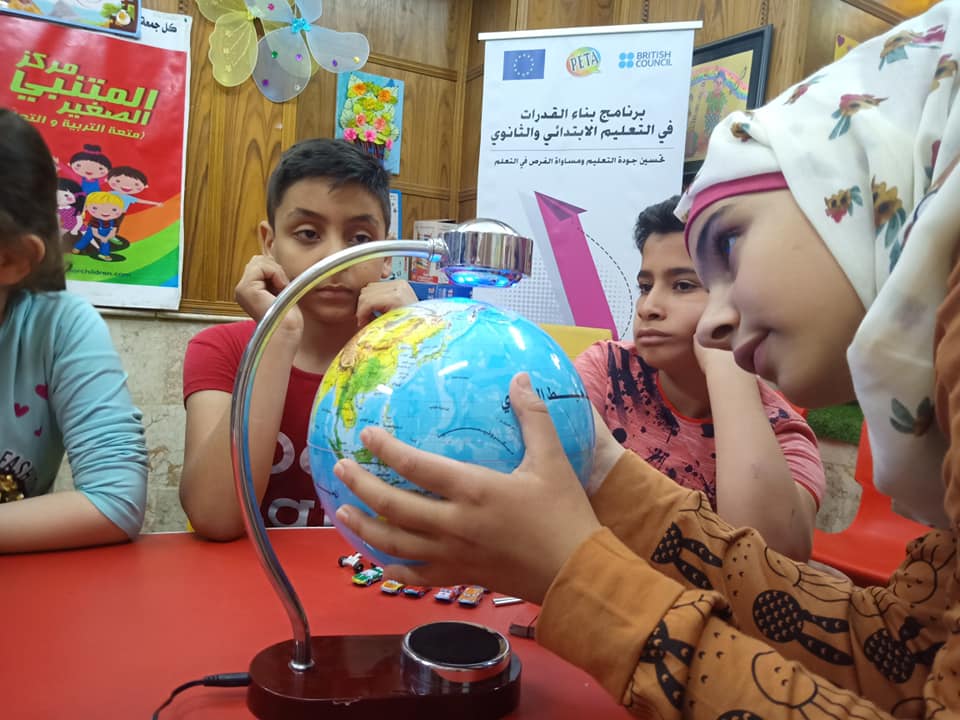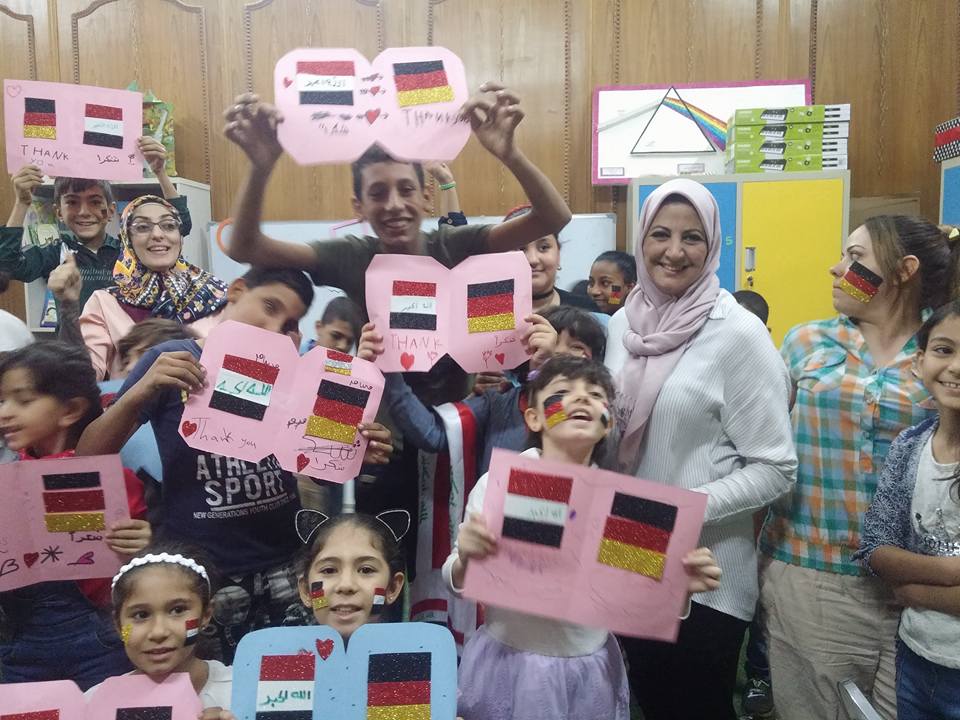Ammal Ibrahim’s project started behind an old door and stair with a poster depicting dreams of children. Her project initially started as a cultural center and later transformed to a training center and, simultaneously, a center for street children reintegration into society.
She firmly believes in a proverb, which states, “children are a fertile land, they are suitable for the plantation of anything, even if the land is neglected for a while, it can be restored.”
Ammar Ibrahim, 51, graduated from the department of biology at the University of Baghdad, but she did not chase the science of biology. Instead, with the help of a friend, who is specialized in literature and linguistic, she opened a cultural center.
At the beginning, the course she opened for children were trainings for writing stories, painting and language course. “Through the courses, I noticed that science and education in Iraq is weak. Perhaps, it was the motivator to initiate my project for children, especially because I am the mother of four children and always feel responsible for them.”
I noticed that science and education in Iraq is weak
Besides, the educational barriers, ethno-sectarian rivalry and the plantation of its seeds in the mind of the children was among the difficulties Ibrahim and her team faced.
After 2014, she came with the idea of opening an educational center for children. “I discussed the initiative with the respective cultural and educational institutions and numerous politicians. There were only verbal supports, not financial, for the initiative.”
Seeking for Financial Support
She did not give up and started her attempts to secure financial support for her initiative. Eventually, she received a grant from an Australian organization. She starting implementing her project and the first barrier was “the expensive rent.”

Baghdad, Ammar Ibrahim giving a lecture to the children. Photo: Ibrahim’s Facebook
“After visiting the cultural center in the Mutanabbi Street, where there are numerous cultural and artistic halls with other hall for agencies. I proposed the idea to Talib Isa, head of the cultural center at the Mutanabbi Street, and perceived he listened to me well. I became hopeful.”
Isa followed her idea and set a period of three months to see the success of her project. From there, her project started and she began painting the door of the hall, depicting the dream of children and wrote on the door of the hall; The Small Mutanabbi Center.
At the center, English, Arabic language, and handwork courses are offered as well as children toys are available for entertainments. Other people can also use the center to offer other courses for children. “It is a center for everyone.”
It is a center for everyone
The Beginning of the Change
In Mutanabbi Street, there are numerous street children, who either are vendors or sometimes wait at the door of the cultural center to be able to enter and play games there. However, the guards at the door deprive them of entrance.
This is when Ibrahim interfered. “I agreed with the guards of the center to leave the children for me. When I asked one of the children if he wanted to enter the center. He asked, “do you agree?” From that, I noticed that the children want to change their lives but no one is helping them to do so,” Ibrahim stated.
When I asked one of the children if he wanted to enter the center. He asked, “do you agree?”
She decided to welcome those children in her center, and stated, “if I had not agreed to welcome those children to my center, I would have been one of thousand people who oppose them. If we do not reintegrate them into the society, we will be a motivator factor to them to learn bad hobbies and work.”
Dealing with Abandoned and Street Children
Ibrahim has faced challenges to change the behavior of the children to reintegrate them with other children. “Their behavior was not appropriate; some of them were stealing the toys. I initially neglected their attitudes to find a suitable way to deal with them.”
“Majority of the children were very responsive to the behavioral change. Soon, some of them, in their capacity, brought food and toys, so that the other children would also benefit from them”
She did not only face challenges to change the children’s attitude, but also was also accused by the family of the children, too.
“Families of some of the street children came to the center and accused me of pushing away their children from work because their children are not only busy with street selling but also with other aspects of life.”
She also thought of finding a solution for such accusation. At a corner of her center, she put children goods for sale so that the children will be able to earn money while they are taking language and art courses at the center.
“The families were supportive. I realized that I achieved support a group of people in the society that neglected by their families and the people who were around them. I saw that as sign of success of my project.”

Baghdad, a child at Ammal Ibrahim’ center looks at world and thinks about it, 2019. Photo: Ammar Ibrahim’s Facebook Page
Ibrahim’s center has reintegrated over 80 abandoned and street children into the society, besides benefiting thousands of other children through the courses the center has offered.
Ammat explained two cases where she could not see pleasing outcomes from two children. “One had experienced sexual harassment and the other belonged to a divorced family where both had seen significant violence. I failed at dealing with those two children and for the sake of other children, banned them from coming to the center.”
Ammal Irabhim is leading a crucial project to reintegrate street and abandoned children into society. However, such significant project has neither been support by the government nor by any politicians.
She now attempts to expand her project through renting a bigger hall that would fit more children.
Zaynab Mashat





